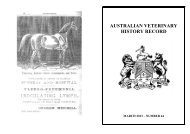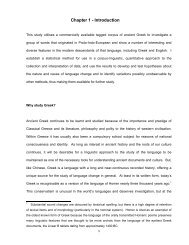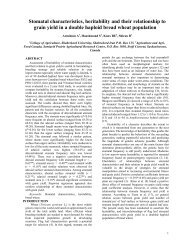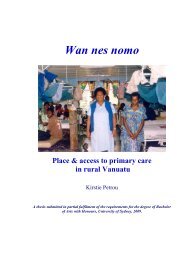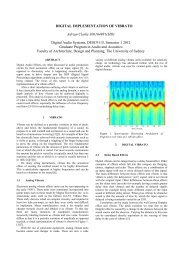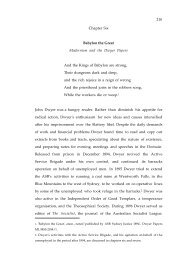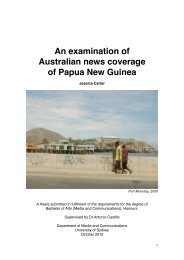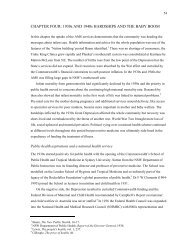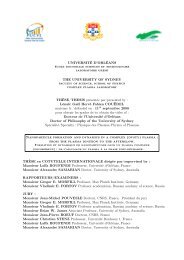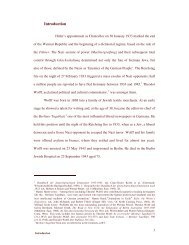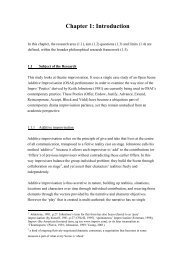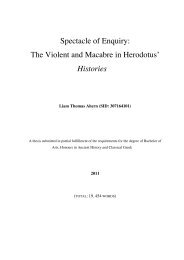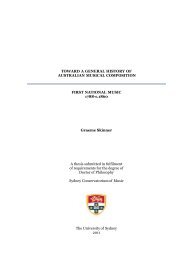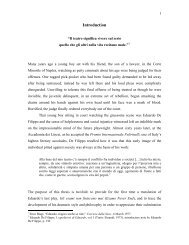journal of digital research & publishing - The Sydney eScholarship ...
journal of digital research & publishing - The Sydney eScholarship ...
journal of digital research & publishing - The Sydney eScholarship ...
You also want an ePaper? Increase the reach of your titles
YUMPU automatically turns print PDFs into web optimized ePapers that Google loves.
1 P M J O U R N A L O F D I G I T A L R ESEARCH & P UBLISHING<br />
<strong>The</strong> aim <strong>of</strong> this ethnographic study revealed through an analysis <strong>of</strong> online parental<br />
blog posts, a general acceptance <strong>of</strong> their young children preparing for the future in these<br />
hypertexted, consumer environments as an important skill.<br />
Young children as consumers/producers<br />
Children are becoming younger and younger users <strong>of</strong> this new hypertext freeway, which<br />
is being explored as to the changes in literacy amongst these new audiences. A hypertext<br />
environment, explained by Weinberger (2010) is a ‘type <strong>of</strong> punctuation which instead<br />
<strong>of</strong> ending continues and encourages further exploration to a new ‘thing, page or world’.<br />
<strong>The</strong> environment allows for a joint connection <strong>of</strong> ideas and creates a map or a bottom up<br />
creation <strong>of</strong> a linked world’ as opposed to an expert who dictates the navigation.<br />
<strong>The</strong>se new media mixes have been examined in recent terms, as it is being suggested that<br />
"%G&8%4"$6$7"*&7D&0%8$3&#$6%>359&3>%&)%570$",&3&5>$6$53#&570'7"%"6&67&D(6(>%&%8(536$7"&<br />
(Livingston 2004; Buckingham 2007). <strong>The</strong> argument surrounding children as consumers<br />
is whether they are becoming ‘passive victims <strong>of</strong> a consumer society’ or are actively making<br />
8%5$*$7"*& 7"& G+%6+%>& 6+%& '>78(56& 46*& 6+%$>& 5(#6(>3#& "%%8*M& `"6%>%*6$",#9S& G+36& $*& )%$",&<br />
>%I%3#%8&$*&6+36&>%*%3>5+%>*&3"8&6+%$>&4"8$",*&3>%&)%,$""$",&67&&3#$,"&G$6+&6+%&03>H%6%>*a&<br />
that children are not that easily led and basically hold the cards as to their interests and<br />
consumer powers. Children in the consumer society are capable <strong>of</strong> constructing their own<br />
$8%"6$69&3"8&"%%8*M&&!''7*$",&6+%*%&4"8$",*&3>%&6+%&G%#D3>%&530'3$,"%>*&G+7&'(6&D7>G3>8&<br />
the argument that children on websites which use advertising is immoral (Buckingham<br />
2007 p. 3).<br />
Jenkins (2006a) has been calling into discussion the need to <strong>research</strong> this relatively<br />
new participatory culture, where literacy’s are colliding in a new semantic space. Many<br />
authors are now asking, (Jenkins, 2006; Livingston, 2003 and Buckingham 2007, where<br />
are children positioned in this landscape between consumerism and production and how<br />
do children interpret this media. <strong>The</strong> need to educate children to understand and interpret<br />
new media is an important focus.<br />
David Buckingham (2007) also draws on the notion <strong>of</strong> parents ‘emotional investments<br />
in children’s consumption, as many parents now spend long hours away from the family<br />
home. <strong>The</strong> guilt <strong>of</strong> a parent may also be to provide what they consider ‘edutainment’ where<br />
6+%&'3>%"6&'%>5%$I%*&6+%&7"#$"%&5700("$69&3*&)%"%45$3#&67&6+%&5+$#8L*&8%I%#7'0%"6&3"8&<br />
H%%'$",&3)>%3*6&7D&6%5+"7#7,9M&&&!"&6+%&C$'&*$8%&7D&,30%*&3*&3"&%",3,$",&0%8$3&D7>&97(",&<br />
children, consumerism in childrens spaces is crowding creativity and media production.<br />
100



